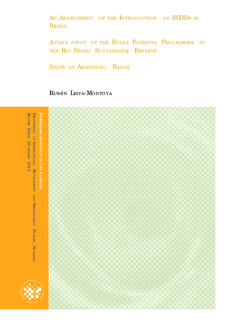| dc.description.abstract | The project “Impacts on poverty and sustainable development of the REDD architectures: for
equity options, growth and for the environment” (POVSUS-REDD) is aimed at increasing the
understanding of how different options for REDD will affect the achievement of reducing
greenhouse gas emissions while benefitting sustainable development and poverty reduction.
In such a context, this thesis is part of a study that assesses the processes of introduction of
REDD+ in Brazil and Tanzania. The focus of this research is the Brazilian case.
In Brazil, the POVSUS-REDD project is coordinated by the ‘Sustainable Amazonas
Foundation’ (FAS), being Bolsa Floresta the programme under which REDD+ is being
implemented. The aim of this thesis is to document and evaluate the process of introducing
REDD+ in the Rio Negro Sustainable Reserve (RDS Rio Negro) in Brazil.
The RDS Rio Negro in the State of Amazonas was selected as the research area due to its
proximity to the state capital (Manaus), easy access, and mostly because all four components
of the programme Bolsa Floresta are running in this area.
The thesis used theories of ‘institutions and institutional change’, ‘participation’ and ‘process
legitimacy’ in order to classify the findings collected from a combination of both qualitative
and quantitative research methods. For the collection of qualitative data, interviews were used
with resource persons from the FAS, the government’s organisations and the local
communities; and focus group discussions were used with members of the communities. The
quantitative data was collected using questionnaires with the people from the communities.
The findings showed that there were institutional and organisational changes in the area as a
result of the process of introducing Bolsa Floresta. The family component of the programme
(BFF) created new institutions related to the introduction of a contribution to each family that
commits to BFP individually. These findings are classified using theories of institutions and
institutional change.
Regarding the association component (BFA), it was found that a new organisation was
created to organise the people of the communities in order to increase participation and
involvement in matters concerning the RDS’ as a whole. In the case of BFR and BFS, a vast
vii
number of projects aimed at improving the infrastructure of each community and creating
income generation projects for its members were started.
The research showed the existence of an unsolved conflict in one of the areas of the RDS.
The conflict is related to the amount of money given from BFF and the illegal extraction of
wood. The people are not satisfied with the amount of money given from the family
component of the programme and in some communities they are exceeding the limits on
wood extraction.
Regarding the evaluation from the people living in the area, one important output is that they
are mostly satisfied with the programme, how it was introduced and recognise that FAS has
done a good job introducing Bolsa Floresta in the RDS. However, the concern amongst the
locals is the amount of money given to each family individually, as they consider it to be low.
On the other side, it was evidenced that the implementing organisations are satisfied with the
development, processes and outcomes of the BFP. However, regarding the reported conflict,
FAS explains that there is a misunderstanding of the rules introduced by the creation of the
RDS and those from the BFP. They argue that the limitations on wood extraction were set
with the RDS and FAS is only contributing to the families for having committed to BFP, thus
the conflict itself is not an outcome of the process of implementing BFP.
The use of qualitative and quantitative methods approach used for this research was
convenient. Using the theories of ‘institutions and institutional change’, ‘participation’ and
‘process legitimacy’ along with the mixed-research methods increased the strengths and
minimised the potential weaknesses of the collected data, analysis of the findings and
discussion. | no_NO |
